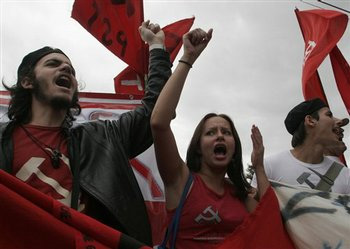
|  |  |  Americas & Beyond | July 2009 Americas & Beyond | July 2009  
Honduras Crisis Talks Resume After Stalemate
 Diego Mendez - Associated Press Diego Mendez - Associated Press
go to original
July 19, 2009


| | Supporters of ousted Honduras' President Manuel Zelaya protest outside the site of talks to resolve the leadership crisis in Honduras in San Jose, Saturday, July 18, 2009. (AP/Kent Gilbert) |  |
San Jose, Costa Rica — Talks to resolve Honduras' political crisis resumed Sunday with the two sides at odds over reinstating the ousted president and creating a reconciliation government.

The two camps seemed to be far from a compromise, with exiled President Manuel Zelaya saying he will return to Honduras soon regardless of the outcome of the negotiations and the interim government vowing to arrest him.

Costa Rican President Oscar Arias, who won the 1987 Nobel Peace Prize for helping end Central America's civil wars, is mediating the U.S.-backed talks and appealed for more flexibility.

The government of interim president Roberto Micheletti on Saturday asked for more time to study Arias' proposal for ending the standoff. It included a national unity government headed by Zelaya, a general amnesty and early elections.

Zelaya was hustled out of Honduras by soldiers in a June 28 coup, launching a major test of Latin American democracy and of the Obama administration's policy toward the region.

He has vowed to return to Honduras to set up a parallel government, though he has refused to say when or how he will enter the country. His aide, Allan Fajardo, would say only that Zelaya planned to return before Friday, the date suggested by Arias for his return.

The Honduran military thwarted Zelaya's attempt to fly home July 5 by blocking the runway at the airport in the capital, Tegucigalpa.

As talks began Saturday, Arias issued a statement proposing a plan that would let Zelaya serve out the final months of his term, move up elections by one month to late October, grant amnesty for all political crimes committed before and after the June 28 coup, and include representatives of the main political parties in a reconciliation government.

He said Zelaya would have to cede control of the military to an electoral court a month before the elections to ensure impartiality and also renounce his plan to hold a referendum on retooling the constitution, which was the spark that launched the coup after the Supreme Court, military and Congress all objected to the vote. An international commission would monitor compliance with the accord.

When asked about the idea of having Zelaya return to Honduras as president with a reconciliation government, Assistant Foreign Minister Martha Lorena Alvarado gave a one-word response: "Impossible."

Her comment in Honduras' capital, Tegucigalpa, was the clearest indication that the talks had deadlocked.

"The reinstatement of Zelaya, as we have maintained and now repeat, is not negotiable ... there is no possibility of him returning to Honduras as president," Alvarado said.

A Zelaya representative, Enrique Flores, said his side had accepted Arias' plan "in principle" but added that the government led by interim president Roberto Micheletti was balking at the key point: allowing Zelaya's return to power. He said that would kill the negotiations.

Before Alvarado's rejection, a representative of Honduras' interim government said her delegation lacked the authority to accept most of Arias' proposals, since decisions on amnesty, changed election dates and permission for Zelaya to return despite warrants for his arrest needed the approval of Honduras' courts or Congress.

"It is up to Congress to grant amnesties, so we cannot commit to something that intrudes on the powers of other bodies," former Supreme Court President Vilma Morales told The Associated Press. "We cannot make commitments that ignore the jurisdiction of the electoral tribunal, and it is also up to Congress to discuss and legislate and issue a decree on moving up the elections."

Honduras' Supreme Court issued an arrest warrant for Zelaya before the coup, ruling his effort to hold a referendum on whether to form a constitutional assembly was illegal. The military decided to send Zelaya into exile instead – a move that military lawyers themselves have called illegal but necessary.

Many Hondurans viewed the proposed referendum as an attempt by Zelaya to push for a socialist-leaning government similar to the one his ally Hugo Chavez has established in Venezuela.

Associated Press writers Marianela Jimenez in San Jose, Costa Rica, and Mark Stevenson in Tegucigalpa, Honduras, contributed to this story. |

 |
|  |



